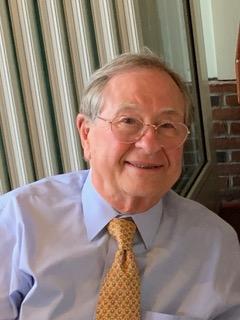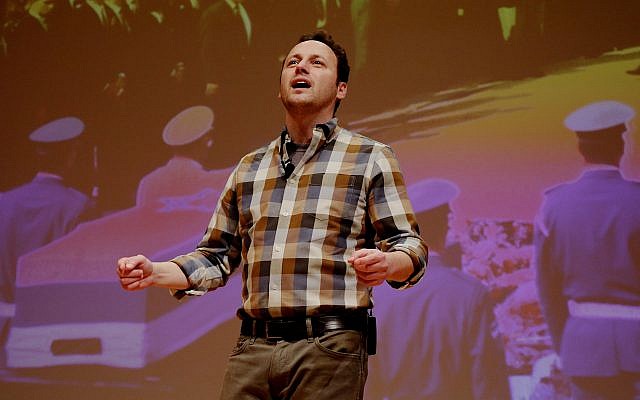Playwright Encourages Difficult Conversation About Israel
After the 2014 Gaza War, Israeli-born photojournalist now living in New York City, Gili Getz, realized that political conversations with his father had become untenable.
After the 2014 Gaza War, Israeli-born photojournalist now living in New York City, Gili Getz, realized that political conversations with his father had become untenable. He recognized that his Latvian-born father, a former Labor Party politician who still lived in Israel, had moved “a little” to the right while Getz had moved “a little” to the left. Appreciating that other families also experienced difficulties talking about Israeli politics, Getz wrote his one-person play, “The Forbidden Conversation” to encourage those discussions among American Jews.
“The play is about the difficulty the American Jewish community has discussing Israel,” Getz told the AJT. “It’s not about the Israeli-Palestinian conflict itself. This is about how we talk about Israel.” Getz, an actor and activist, will perform the play and moderate a conversation afterwards at a program Aug. 27 at Congregation Or Hadash sponsored by the Atlanta chapter of J Street, a liberal Israel advocacy group.
Reflecting on his conversations with this father when he’d be back home in Beersheva, Getz “was very concerned it would compromise our relationship. I spoke to many people who pay a personal price. It costs a lot of relationships.
People walk away from the Jewish community and feel alienated. I felt we must be able to have the conversation. In my play, I’m challenging and providing space by confessing my personal story.”
Getz was born in Israel in 1974 just after his parents made aliyah from Latvia. He was a photographer during his military service in the early 1990s. “My last assignment was to photograph the funeral of Prime Minister Yitzhak Rabin,” he said. He moved to the United States in 1997. In recent years, his work has focused on Jewish-American politics, getting published in various Jewish and Israeli media.
He has performed the play more than 40 times, under the auspices of Federations, Hillels, synagogues, the American Israel Public Affairs Committee, and J Street.
Cedric Suzman, co-chair of the J Street Atlanta steering committee, is excited about bringing “The Forbidden Conversation” to Atlanta. “It explores the challenges of having a conversation about Israel in the American Jewish community. Gili is a stand-up presenter with a serious message,” he told the AJT.
Suzman, who helped found and lead both the World Affairs Council and the Southern Center for International Studies, points out that the upcoming J Street program follows a series of speakers sponsored by the Atlanta chapter, including last year’s talk by former Ambassador Wendy Sherman, former U. S. undersecretary of state for political affairs.
“J Street has had a presence in Atlanta for years, but put together a chapter only in the last couple of years. We are trying to keep a presence here and support the two-state solution. J Street is not outside the mainstream” of the Atlanta Jewish community, he said. “A lot of people don’t know about J Street or think it’s anti-Israel, but that’s based on a misunderstanding from its early days.”

J Street supports a two-state solution for Israel and the Palestinians and is against the controversial boycott, divestment and sanctions movement.
Suzman, who is originally from South Africa, where he supported the anti-apartheid movement, told the AJT that he opposes BDS against Israel. “It can morph into being anti-Israel and anti-Semitic,” he said.
But he acknowledges that it can be “hard to oppose the Israeli government while supporting” the State of Israel. He says he participated in a J Street-sponsored trip to Israel in 2016 and “was hugely impressed. It was a very impactful trip. We talked to Likud leaders, settlers and Palestinian leaders. I got back home and found there were many like-minded people who wanted to become more active.”
Suzman explains that he found his way to J Street through his support of the New Israel Fund, which financially supports non-governmental organizations that work on the ground for civil rights, pluralism and democracy in Israel. J Street and NIF are “two sides of the same coin,” he said. “NIF works in Israel and J Street works here” in the United States.
He believes that it is essential for American Jews to speak up “if they are critical” of Israeli policies. He’s hoping that “The Forbidden Conversation” will open up the discussion of Israel among Atlanta Jews.
The play and discussion will take place at 7:30 p.m. Aug. 27 at Congregation Or Hadash.




comments